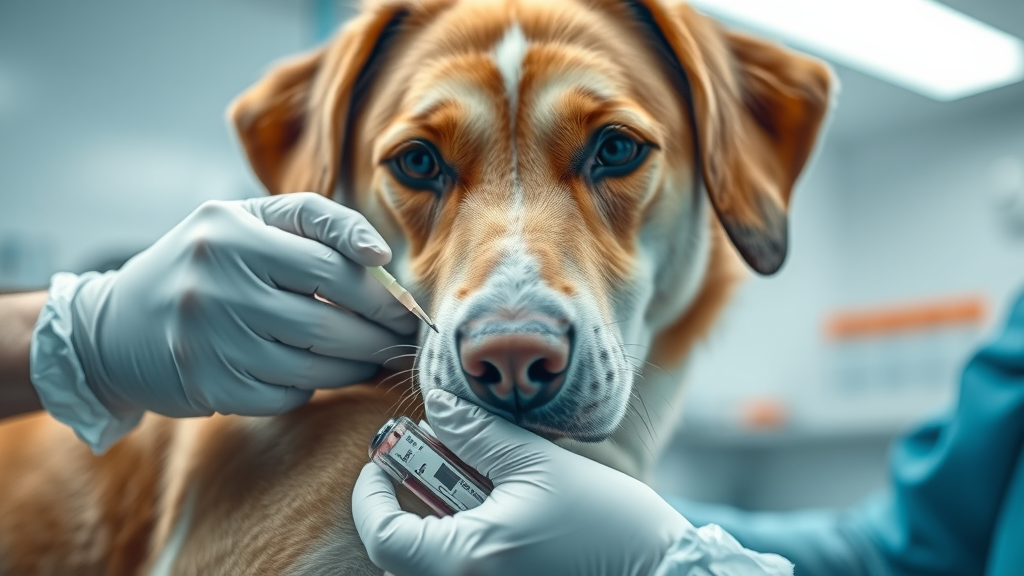Have you ever wondered, "How often should I take my dog to the vet?" Many dog owners assume a single yearly checkup is enough, but is that really true for every furry friend? In this easy-to-understand guide, you’ll discover the actual vet visit schedule for puppies, adult dogs, and senior dogs. Don’t get caught off-guard by hidden health issues—read on to keep your pup happy, healthy, and protected at every life stage!
Curious About How Often You Should Take Your Dog to the Vet? Uncover the True Schedule for Vet Visits
One of the most important questions for every dog owner is how often should I take my dog to the vet? The answer isn’t one-size-fits-all. Your dog’s age, health, breed, and even where you live all play a role in determining the best visit schedule. Puppies need frequent trips to the clinic to build immunity and develop healthy habits. Healthy adult dogs benefit from annual wellness exams to catch issues early and stay current on preventive care, while senior dogs require special attention and more regular checks to stay comfortable and catch any developing health conditions quickly.
Many pet parents are surprised to learn that regular vet visits do far more than treat sickness or injury. These appointments can help identify potential health problems before they become serious, giving your furry friend the best shot at a long, healthy life. Plus, frequent checkups help with disease prevention, like keeping vaccinations—such as rabies, distemper, and kennel cough—up to date. By understanding your dog's unique needs, you’ll make more informed decisions about their vet visit schedule and overall medical care.
"Making regular vet visits is the cornerstone of preventative dog healthcare—not just for emergencies."

Understanding How Often Should I Take My Dog to the Vet? Key Frequency Factors Explained
The schedule for vet visits depends on many unique factors that can change over your pet’s lifetime. Knowing what affects your dog’s healthcare routine can help you spot the signs when a trip to the vet is truly necessary. Here’s what impacts how often you should take your dog to the vet:
- Age of your dog (puppy, adult dog, senior dog): Younger and older pups need more frequent checkups due to development and aging concerns.
- Breed and genetics: Certain breeds are more prone to specific health conditions, requiring different screening schedules.
- Lifestyle and environment: Dogs who spend time in dog parks or outdoor environments may need vaccinations or extra monitoring.
- Pre-existing health conditions: Dogs with chronic diseases or known health issues will require more frequent visits to stay healthy.
- Previous vet visits and health history: A history of recurring problems or treatments impacts how often a vet may recommend, “bring your dog in for a check.”
- Vaccination and preventive care schedule: Keeping up with shots, parasite control, and preventive medications can determine visit frequency.

Life Stage Matters: Vet Visit Schedules for Puppies, Adult Dogs, and Senior Dogs
Vet Visits for Puppies: Building Healthy Habits Early
Raising a puppy is exciting—and a lot of work! One of the first responsibilities is to take your puppy to the vet for an initial wellness exam within the first week of bringing them home. This visit helps ensure your pup is free from health problems and starts their vaccination series on time. Vet visits for puppies are usually monthly until 16 weeks, allowing your veterinarian to monitor their growth, give crucial vaccines, start deworming, and spot early signs of illness.
- Initial wellness exam within the first week
- Monthly checkups until 16 weeks
- Vaccinations and deworming schedule
- Physical exam every visit

How Often to Take Your Adult Dog to the Vet: Routine Care
An adult dog —typically between 1 to 7 years old—needs a consistent, yearly wellness exam to stay healthy. This annual checkup allows your vet to perform a full physical exam , suggest age-appropriate blood work , and update preventive treatments or vaccines. Adult dogs with active lifestyles, or those exposed to other animals, may require more regular vet visits, while a healthy adult dog with a less active lifestyle might be fine with once-a-year appointments.
- Annual wellness exams
- Physical exams yearly
- Blood work and diagnostic screenings as recommended
- Wellness check for preventive care
Senior Dogs Need Special Attention: Vet Visits as Dogs Age
Once your best friend reaches seven years of age—or sooner if they’re a larger breed—they’re considered a senior dog . Senior dogs are more at risk for chronic diseases, arthritis, and age-related health issues. That means they require more frequent vet visits—ideally every six months. These biannual appointments include comprehensive exams, tailored vaccine schedules, and diagnostic tests to detect health conditions early, helping your dog maintain a high quality of life.
- Biannual wellness exams
- Monitoring for age-related health conditions
- Adjusting vaccine schedules
- Comprehensive physical exams each visit
Comprehensive Wellness Exams: Why Regular Vet Visits Are Critical for Your Dog’s Health
A wellness exam is more than just a quick check of your dog’s temperature and weight. These regular vet visits are critical to spotting issues like heart murmurs, dental problems, early kidney disease, or lumps that could become cancerous. For puppies , wellness exams help build their immune system and set healthy lifestyle habits. For the healthy adult dog , annual wellness visits lay the groundwork for tracking changes year to year, ensuring preventive care like vaccines and parasite checks remain on schedule. And for senior dogs , these visits catch health problems before they become advanced or painful.
| Life Stage | Frequency of Vet Visits | Typical Procedures |
|---|---|---|
| Puppy | Monthly (to 16 weeks) | Vaccines, exams, deworming |
| Adult Dog | Annually | Physical exam, blood work |
| Senior Dog | Biannual (2x yearly) | Physical, blood work, health checks |
"Early detection through regular wellness exams can extend your dog's healthy years dramatically."
Signs Your Dog Needs Extra Vet Visits Beyond Wellness Exams
Sometimes, wellness visits aren’t enough. Every dog owner should learn to recognize signs that a trip to the vet is needed outside the regular schedule. Rapid shifts in appetite or behavior, vomiting, diarrhea, new lumps, or persistent scratching are all urgent reminders. Don’t wait for a scheduled checkup if you suspect something’s wrong— visit the vet promptly to address potential health issues before they worsen.
- Sudden changes in behavior or appetite
- Noticeable health issues (vomiting, diarrhea, coughing)
- Signs of pain or discomfort
- New lumps or bumps
- Persistent scratching or skin problems

Preventive Care During Vet Appointments: Vaccinations, Physical Exams, and More
What Happens During a Physical Exam at Every Vet Visit?
Each vet visit includes a thorough physical exam . Vets check your dog’s weight and body condition, listen to their heart and lungs, examine their teeth, gums, ears, and eyes, and look for signs of infection, abnormal growths, or skin issues. These exams ensure early detection of potential health risks and allow your vet to discuss your pet’s diet, lifestyle, and preventive treatments.
- Weight and body condition check
- Heart and lung assessment
- Dental and oral examination
- Checking ears, eyes, and skin
- Discussion of diet and lifestyle

What Is Involved in Routine Blood Work and Why It Matters
Blood work is another central part of preventive care, especially for adult and senior dogs . Through blood tests, your vet can detect problems with organ function, screen for infections, and spot health problems before symptoms appear. This is especially important if your dog is aging, has a chronic health condition, or takes long-term medications.
- Detecting early health problems
- Monitoring organ function
- Screening for infections and diseases

Are Wellness Exams and Vet Visits the Same? Setting Expectations
Many pet parents use " vet visit " and " wellness exam " interchangeably, but there are key differences. A wellness exam is a preventive appointment aimed at catching problems before they start, while other vet visits may be for treating a specific illness or injury. Both involve thorough physical assessments, but preventive care emphasizes maintaining overall wellness and updating vaccines, while a sick visit focuses on treating existing symptoms.
- Wellness exam focuses on prevention
- Vet visits may be illness or injury related
- Both include physical assessments
How to Prepare Your Dog for the Vet Appointment: Stress Reduction Tips
Many dogs feel anxious about a vet appointment . Preparing your pup for the visit makes the experience smoother for everyone. Practice gentle handling and quick exams at home, use treats or positive reinforcement, bring comfort items like a blanket or favorite toy, and arrive a bit early so your dog can relax and adjust to the new surroundings. Reducing stress ensures vet visits are positive, and your dog is less fearful for future appointments.
- Practice gentle handling at home
- Use positive reinforcement
- Pack comfort items (favorite toy, blanket)
- Arrive early for acclimatization

How Often Should I Take My Dog to the Vet? The Cost Factor and Pet Insurance Tips
Regular vet visits are an essential part of responsible dog ownership, but they do come with financial considerations. Costs vary by life stage and procedure—puppies often incur higher costs due to initial vaccinations and exams, while senior dogs may need more frequent diagnostic tests like blood work. Many pet owners find that investing in preventive care and pet insurance helps them manage costs and avoid surprise expenses down the line. Explore your options and discuss with your vet to build a budget-friendly, effective healthcare routine.
| Life Stage | Average Cost Per Visit | Notes |
|---|---|---|
| Puppy | $100 - $300 | Initial vaccines |
| Adult Dog | $100 - $250 | Annual checkup |
| Senior Dog | $150 - $350 | Blood work often |
People Also Ask: Your Most Common How Often Should I Take My Dog to the Vet? Questions Answered
Are dogs supposed to have a yearly checkup?
- Yes, most adult dogs benefit from at least one annual wellness exam and physical exam to catch early signs of health issues and stay current on vaccinations.
How long can a dog go without going to the vet?
- A dog should ideally not go more than one year without a vet visit. Longer periods increase the risk of unseen health problems developing.
How often should your dog get a wellness check?
- Most dogs need a wellness check at least once a year; senior dogs or those with chronic health issues may require checks every 6 months.
Can I get in trouble for never taking my dog to the vet?
- Depending on local laws, neglecting regular vet care may be considered a form of animal neglect, which can lead to legal consequences in some areas.
Additional FAQs on Vet Visits and Dog Health
- What vaccinations are mandatory for my dog?
- How do I know if my dog is due for a vet visit?
- What’s the difference between emergency and wellness visits?
- How can I find a trusted veterinarian?
Key Takeaways for How Often Should I Take My Dog to the Vet? Responsible Dog Ownership Reminders
- Regular and age-appropriate vet visits are non-negotiable
- Health needs change as your dog ages
- Preventive care is often less expensive—and more effective—than treating illness
Ready to Keep Your Dog Healthy? Subscribe for Trusted Vet Advice and Monthly Tips
- We can’t teach your dog to sit — but we can deliver great pet advice every month. 🐕 Subscribe to the newsletter and fetch some fun!
Regular veterinary visits are crucial for maintaining your dog’s health throughout their life stages. For adult dogs, annual check-ups are recommended to monitor overall well-being and update vaccinations. Senior dogs, typically those over seven years old, benefit from biannual visits due to increased susceptibility to age-related health issues. Puppies require more frequent visits, often every 3-4 weeks until they are about 16 weeks old, to ensure proper growth and timely vaccinations.
For a comprehensive understanding of the recommended veterinary visit schedules for dogs at different life stages, refer to the American Animal Hospital Association’s guide, How Often Should My Dog Go to the Vet? A Dog Life Stage Guide . This resource provides detailed insights into the frequency and nature of vet visits tailored to your dog’s age and health status.
Additionally, PetMD offers an informative article titled How Often Should I Take My Dog to the Veterinarian? , which outlines the importance of regular check-ups and what to expect during these visits. These resources will equip you with the knowledge to make informed decisions about your dog’s veterinary care schedule.
 Add Row
Add Row  Add
Add 




Write A Comment